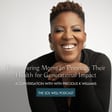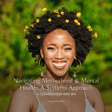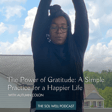
Thriving with ADHD & Anxiety: A Conversation with Therapist Tiffany Dennis LPC
In this episode, we delve into the challenges and triumphs of adults living with ADHD and anxiety. Our guest, Tiffany Dennis, a licensed professional counselor, offers valuable insights and practical advice. Learn how to manage symptoms, reduce stress, and create a supportive environment for yourself and your family.
Key Takeaways:
- Understanding the complexities of ADHD and anxiety in motherhood
- Strategies for managing symptoms and reducing stress
- Breaking down stigmas and seeking support
- The importance of self-care and self-compassion
Guest Bio
Tiffany, a licensed professional counselor based in Atlanta, Georgia. Specializing in ADHD and anxiety, she works with individuals and couples who navigate these challenges. As a fellow ADHDer & clinician, she deeply understand the neurodivergent brain, particularly in professionals, creatives, and entrepreneurs.
She’s also an ADHD Certified Clinical Services Provider (ADHD-CCSP). I provide counseling services & personalized executive functioning coaching. Her treatment approach is holistic, blending cognitive-behavioral therapy, mindfulness, and psycho-education, providing a safe space for healing and growth. She empowers clients with practical skills to enhance executive functioning, crucial for long-term success. Services include individual counseling, coaching, self-paced workshops, and couples therapy.
Episode Highlights:
- Defining ADHD and anxiety
- The intersection of ADHD and anxiety in motherhood
- Practical tips for managing symptoms
- Breaking down stigmas and seeking support
- The importance of self-care and self-compassion
Resources:
- Website: www.theatlantatherapist.com
- IG: @theatlantatherapist
- www.additudemag.com
- www.chadd.org
- Book Mentioned: Driven to Distraction
- https://www.reddit.com/r/ADHDMoms/
- https://www.reddit.com/r/adhdwomen/
Call to Action:
Share your experiences and connect with other mothers on our social media channels or hashtag #IAMSOLWELL. Let's build a supportive community together!
Connect With Us
instagram | linkedin | facebook | Join the Community





![Life after [baby] loss A conversation with Alishia Anderson image](https://media.zencastr.com/cdn-cgi/image/width=112,quality=85/image-files/61fb5028559b7100aee9f217/492cabf0-4479-488c-b19c-2873fe6bdce8.png)













